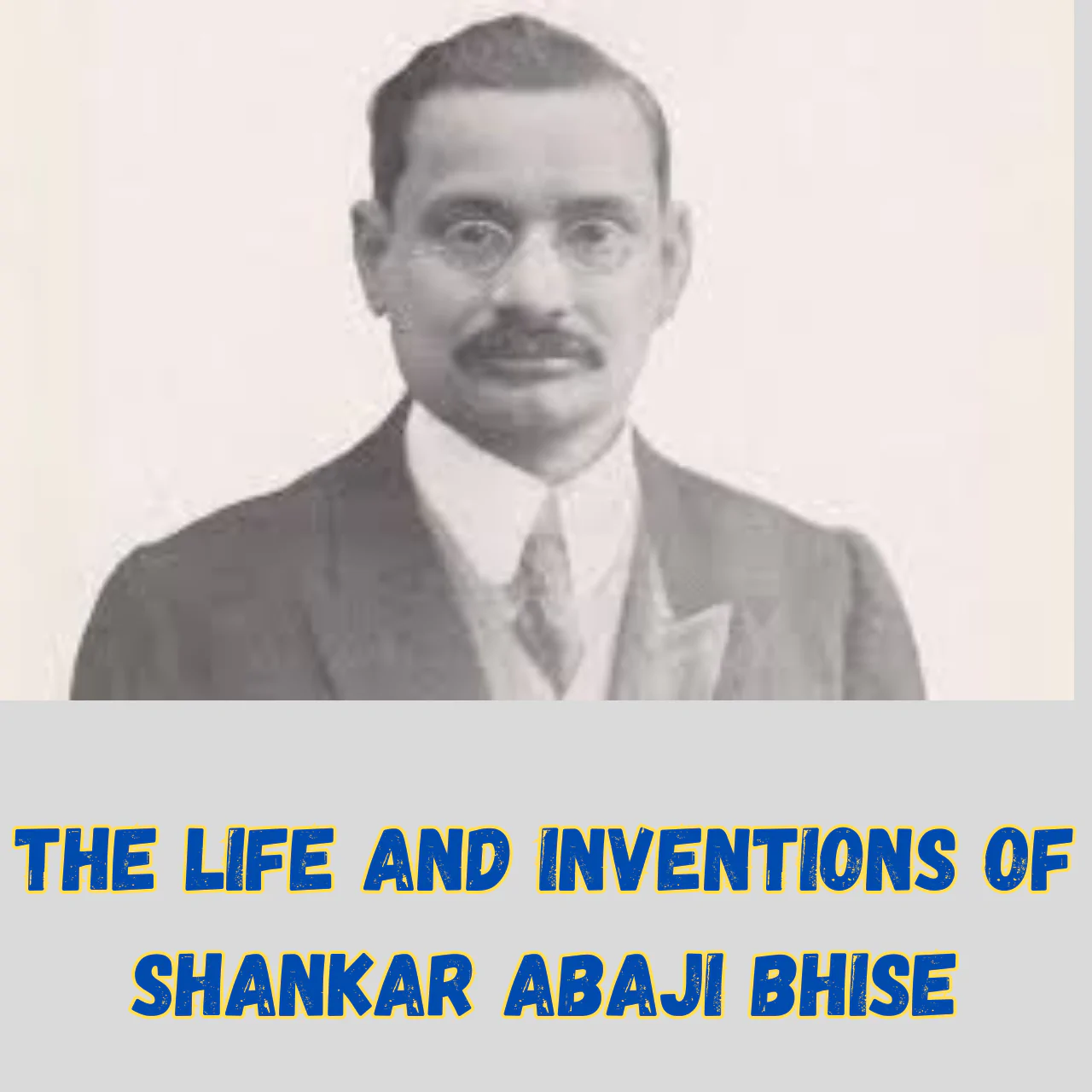The Life and Inventions of Shankar Abaji Bhise, India’s Edison

As you read through this article, you will learn about the inspiring life and groundbreaking inventions of Shankar Abaji Bhise, who is considered by many to be India’s own Thomas Edison. With little formal education and training, Bhise overcame adversity through hard work and determination to become an incredibly prolific inventor. He obtained over 40 patents and developed devices aimed at improving the daily lives of the common man and woman in India. Bhise’s ingenious inventions spanned fields like agriculture, transportation, medicine, and engineering. By highlighting some of his most impactful inventions and the challenges he faced along the way, this article will give you a glimpse into the remarkable mind and persevering spirit behind one of India’s most prolific inventors. Discover how Bhise earned his title as the Edison of India through a lifetime of creative problem-solving and tireless innovation aimed at uplifting his country.
You may not have heard of Shankar Abaji Bhise, but this self-taught Indian inventor from the late 19th century was once dubbed the “Edison of India.” Born into poverty in Bombay in 1867, Bhise had little formal education. Yet his insatiable curiosity and knack for tinkering led him to create over 100 inventions and secure 40 patents in his lifetime.
As a youth, Bhise voraciously read issues of Scientific American magazine, teaching himself principles of science and engineering. His inventions spanned fields from agriculture to transportation to everyday household items. Some of his creations included a unique clutch for bicycles, a coconut deshelling machine, and devices to help aid the blind and deaf.
Despite his prolific output, Bhise struggled to commercialize his inventions and gain recognition during his era. Racial discrimination and lack of funds were major barriers. It was not until after his death in 1935 that Bhise’s contributions began to be celebrated in India as an inspirational, self-made inventor.
Like his American counterpart Thomas Edison, Bhise was a remarkably prolific and self-educated inventor. Both men came from humble backgrounds yet possessed an unquenchable drive to solve problems through innovation. While Edison became a world-renowned figure, Bhise’s life story serves as an uplifting underdog tale of ingenuity and perseverance against the odds.
Bhise’s Early Life and Education
Shankar Abaji Bhise was born in 1867 in a small village of colonial Bombay. His early life was marked by humble beginnings – his father worked as a court worker and could barely make ends meet for the family. Despite facing financial constraints, young Bhise exhibited an insatiable curiosity and an innate talent for tinkering with mechanical devices from a very young age.
At just 14 years old, Bhise’s passion for invention blossomed when he constructed a small device at home that produced coal gas. This early achievement foreshadowed his future as a prolific inventor and earned him recognition within his local community. Driven by an unquenchable thirst for knowledge, he immersed himself in studying mechanics and the principles of engineering.
Bhise’s formal education was limited to high school, but his determination to learn knew no bounds. In 1904, at the tender age of 16, he founded the “Scientific Club” in Bombay (now Mumbai). This club served as a platform for like-minded individuals to gather, share ideas, and engage in discussions on various scientific topics. Monthly meetings fostered a vibrant exchange of knowledge and fueled Bhise’s aspirations to make significant contributions to the field of science and technology.
Despite facing numerous obstacles, including financial constraints and a lack of formal training, Bhise’s unwavering spirit and relentless pursuit of knowledge propelled him forward. His early life exemplified the power of determination and the ability to turn adversity into opportunity. The foundations laid during these formative years would pave the way for his remarkable journey as an inventor, a journey that would earn him the moniker “India’s Edison.”
In an Interview to a Brooklyn Newspaper, Bhise said that “”I owe everything to the mechanical education I received from that American magazine”. Soon after the publication about Bhise’s achievement and pioneering inventions he became a widely covered personality in the USA as well as the UK.
Bhise’s Groundbreaking Inventions and Discoveries
Shankar Abaji Bhise’s unquenchable thirst for innovation propelled him to secure an astounding 40 patents and develop nearly 100 inventions across diverse fields. His pioneering spirit defied conventional thinking, enabling groundbreaking solutions that streamlined everyday tasks and transformed industries.
Among Bhise’s most celebrated inventions was the illuminated advertising machine Vertoscope, patented in 1901. This revolutionary device harnessed the power of electricity to create dynamic, eye-catching displays – a precursor to modern digital signage. Its impact on the advertising landscape was profound, ushering in a new era of captivating visual marketing.
Bhise’s inventive prowess spanned a remarkable spectrum, from ingenious kitchen gadgets that simplified culinary tasks to groundbreaking automatic toilet flushers that revolutionized sanitation. His pioneering work on the telephone system laid the foundation for enhanced communication, enabling seamless connections across vast distances. While Bhise’s inventions were ahead of their time, their influence reverberates through modern technology. His relentless pursuit of innovation and his ability to identify and solve practical problems continue to inspire generations of inventors and entrepreneurs, solidifying his status as India’s Edison – a true visionary whose impact transcends borders and eras.
Bhise’s Legacy and Impact on India
Shankar Abaji Bhise left an indelible mark on India’s history as a pioneering inventor. His unwavering curiosity and dedication paved the way for the nation’s technological advancement. With nearly 200 inventions to his name, Bhise’s contributions spanned various fields, from agriculture to transportation.
Among Bhise’s most notable achievements was the Bhisotype, a cutting-edge printing technology. This invention garnered worldwide acclaim, with the New York American hailing Bhise as the “Edison of India.” The Bhisotype’s potential to revolutionize printing methods was widely recognized, solidifying Bhise’s status as a visionary thinker.

Beyond his tangible inventions, Bhise’s legacy serves as a beacon of inspiration for aspiring Indian inventors and scientists. His relentless pursuit of knowledge and innovation has motivated countless individuals to push the boundaries of what is possible. Bhise’s story reminds us that greatness can emerge from humble beginnings, fueled by passion and perseverance.
Bhise’s contributions played a pivotal role in catalyzing India’s technological progress. His inventions not only addressed practical challenges but also demonstrated the nation’s potential for innovation. By breaking new ground, Bhise paved the way for future advancements, inspiring others to follow in his footsteps and contribute to India’s growth.
Bhise’s influence extends beyond the realm of science and technology. His life and work have become a source of national pride, showcasing the ingenuity and resourcefulness of the Indian people. His legacy continues to inspire generations of Indians, reminding them of the transformative power of knowledge and the importance of pushing boundaries.
FAQs About Shankar Abaji Bhise, the Edison of India
Who was Shankar Abaji Bhise?
Shankar Abaji Bhise (1867-1935) was a prolific Indian inventor and engineer who earned the moniker “the Edison of India.” Born into a poor family in Maharashtra, he overcame immense challenges to become a pioneer in several fields through his ingenious inventions and contributions.
What were some of his major inventions?
Some of Bhise’s most notable inventions include:
- A groundbreaking process to extract gasoline from waste products like molasses
- An early version of a mechanical weighing scale
- Novel techniques for manufacturing ceramics and cement
- Improvements to the sugar refining process
- Bhisotype : a revolution in printing technologies
- Vertoscope : Multiple Colored Advertisements technology
- Baseline later renamed as Atomidine : Iodine Based Formulation to cure diseases
His inventions spanned diverse domains like petroleum, ceramics, chemistry, mechanics and agriculture – a true testament to his versatility and intellect.
How did he overcome adversity?
Despite having little formal education and facing problems, Bhise was relentless in his pursuit of knowledge. He taught himself skills like mechanical drafting, physics and chemistry through extensive reading and hands-on experimentation. His journey garnered support from the major industrialists and personalities of his era including Ratanji Tata, Sayajirao Gaikwad and Dadabhai Naroji.
Why is he called the “Edison of India?”
Like Thomas Edison, Bhise was a prolific and visionary inventor whose creations had far-reaching impacts. From extracting fuel to improving industrial processes, his innovations transformed multiple sectors and paved the way for India’s scientific advancement.
The New York American Newspaper termed the word “ Edison of India” for Shankar Abaji Bhise.
Moreover, Bhise’s story of overcoming socioeconomic barriers purely through self-education, hard work and determination mirrors Edison’s own journey – earning him the esteemed moniker.
Conclusion
As we have seen, Shankar Abaji Bhise was a prolific inventor whose innovations helped improve the lives of many in India. Though he did not achieve the worldwide fame of Thomas Edison, his ingenious creations such as the automatic railroad crossing gate and the infinite speed regulator brought him renown in his native country. Bhise overcame poverty and lack of formal education to become one of India’s most prominent inventors. His passion for learning and innate curiosity led him to create devices that solved pressing problems of his era. Bhise’s little-known story deserves to be told, as he represents the power of human creativity and perseverance. By honoring Bhise’s legacy, we keep alive the spirit of innovation and progress that he embodied.


